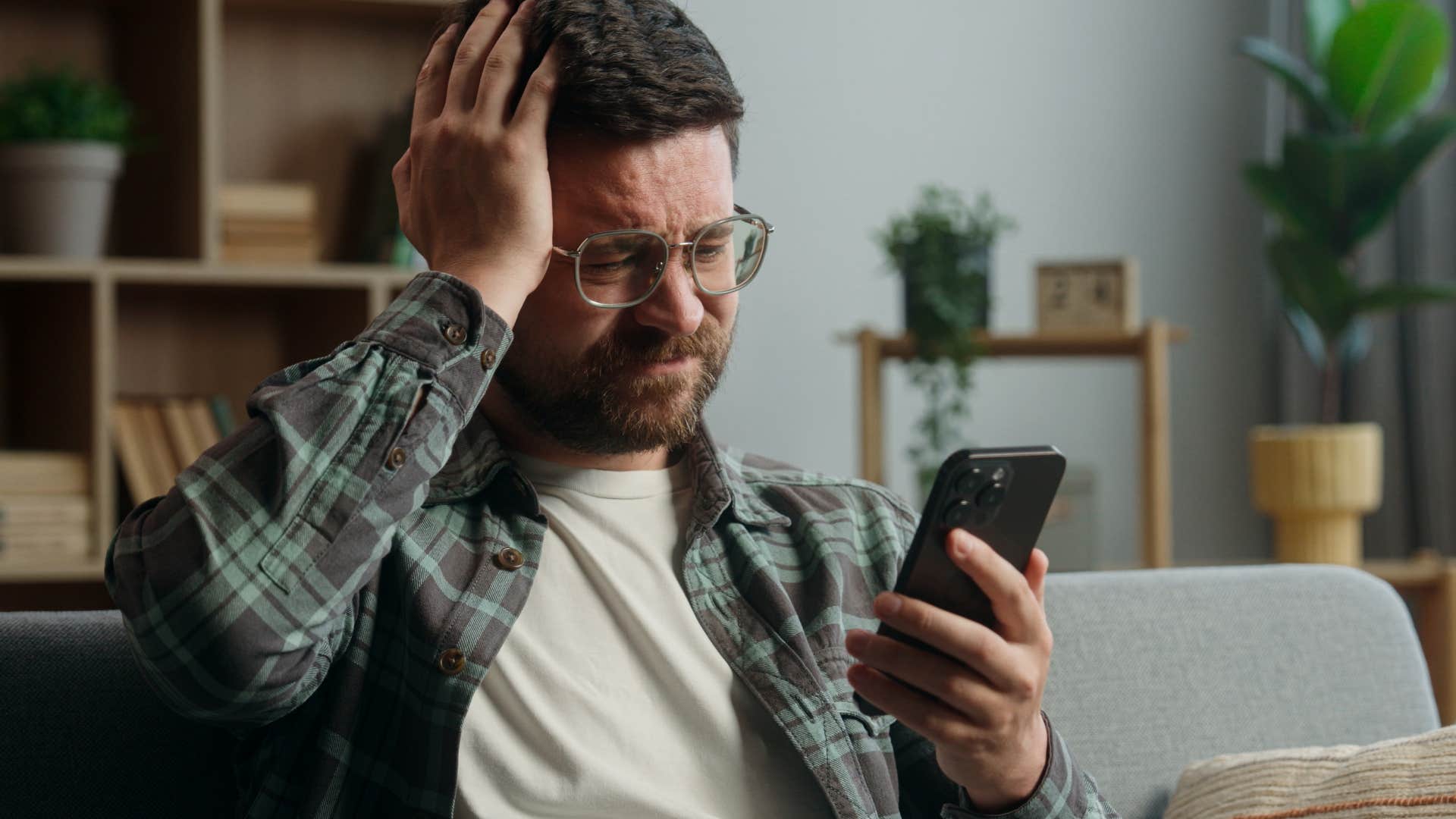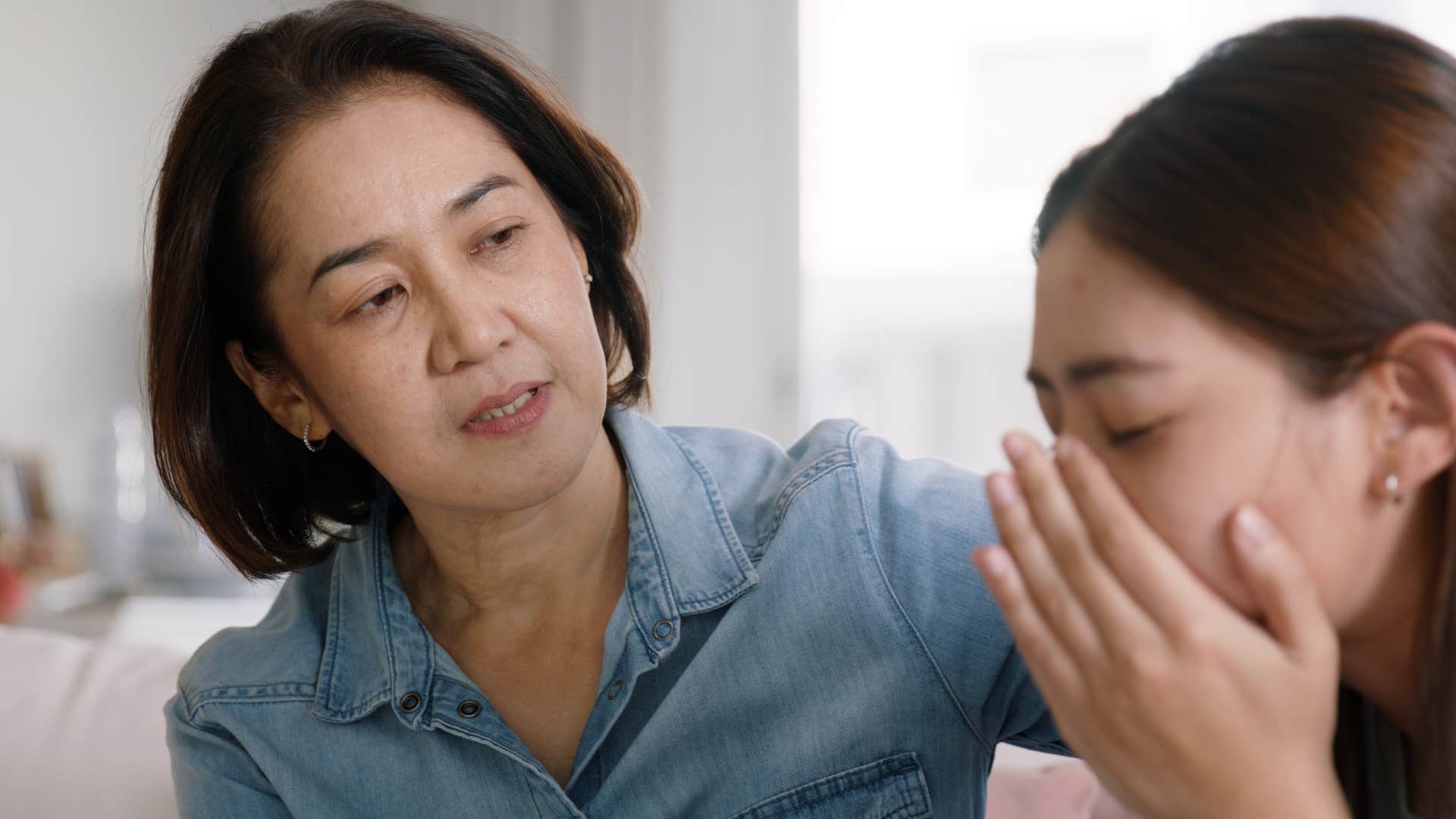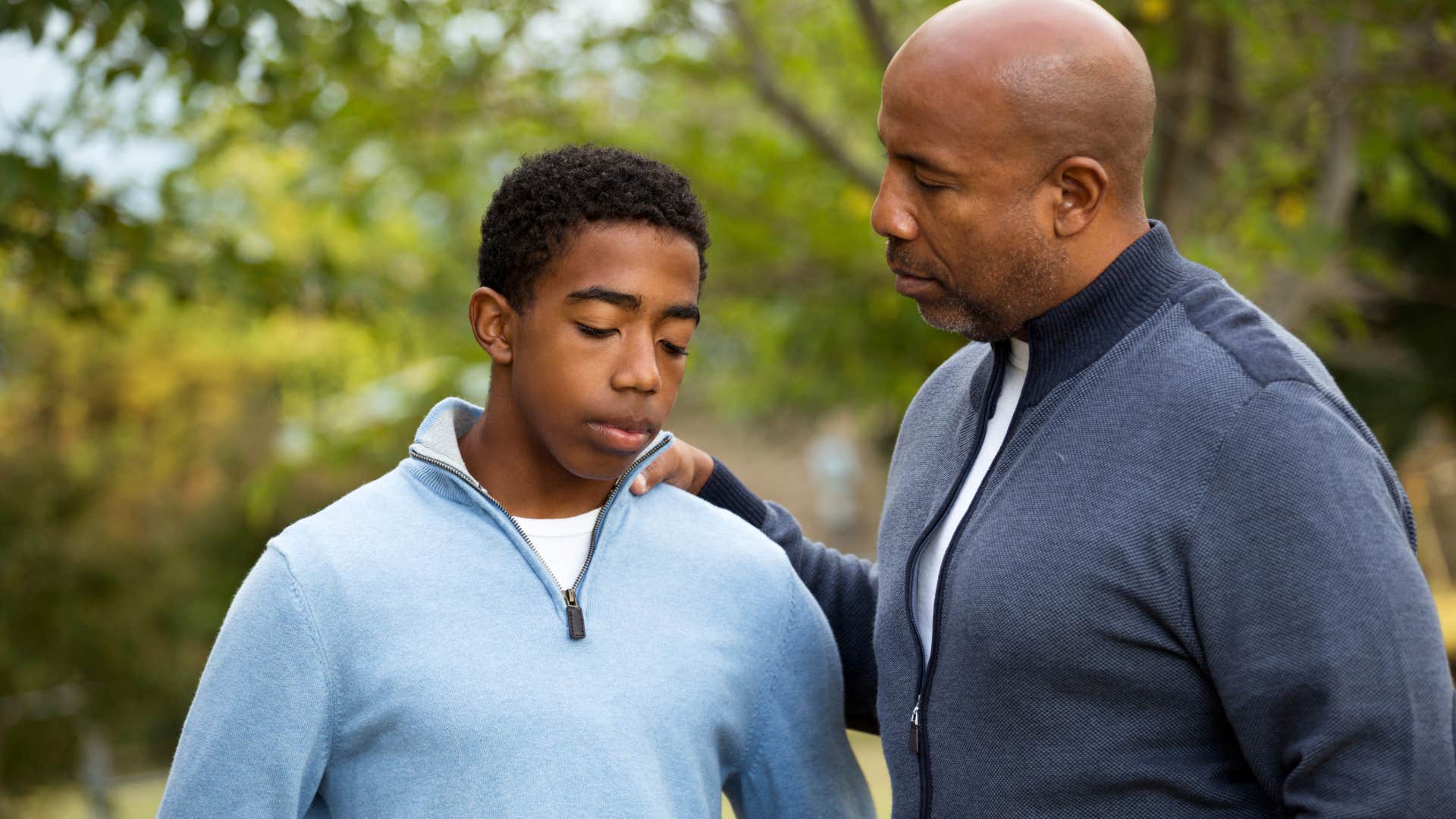11 Phrases People Say When They're Miserable But Don't Want To Admit It
It's hard to admit when you're struggling.
 PeopleImages.com - Yuri A | Shutterstock
PeopleImages.com - Yuri A | Shutterstock Feeling miserable isn't always attributed to one specific cause; in fact, according to a study from the journal Kyklos, it can be a side effect of many things, from mental illness, to poverty, and even unemployment. It's personally draining and emotionally exhausting to feel miserable all the time, and even though receiving social support can aid some of its side effects, many people deal with internal shame and guilt that prevents them from asking for help.
Instead, they rely on many of the phrases people say when they're miserable but don't want to admit it to dismiss their own needs, people-please to protect the peace with others, and avoid addressing the root of their negative mentality. Pushing back on these phrases doesn't often spark true honesty and vulnerability, but recognizing them as signs someone needs subtle support without judgment can be productive.
Here are 11 phrases people say when they're miserable but don't want to admit it
1. 'I'm just tired'
 Butsaya | Shutterstock
Butsaya | Shutterstock
While many people use phrases like "I'm just tired" or "I didn't get enough sleep" as a disguise for their misery or mental health struggles, the truth is that fatigue can be a symptom of experiences like depression. According to a study from Innovations in Clinical Neuroscience, fatigue — from physical energy levels, to emotional exhaustion, and cognitive impairments — are all common in people experiencing depression.
That's why this is one of the phrases people say when they're miserable but don't want to admit it. It's not always an excuse, but sometimes it's because it's difficult to differentiate between exhaustion, burnout, and other more serious mental illness and concerns.
2. 'I'm fine'
 fizkes | Shutterstock
fizkes | Shutterstock
When someone says "I'm fine" without a thoughtful facial expression, positive body language, or a welcoming tone, they're often using it as a disguise for deeper emotional turmoil. For many people, it's a way to pretend they're fine to help other people feel more comfortable or to avoid "burdening" people with their internal struggles, no matter how misguided that may be.
So, the next time someone says "I'm fine" when their actions or behaviors tell you otherwise, don't simply sweep it under the rug — ask thoughtful questions, be there to support them, and make an effort to listen without judgment or unnecessary criticism.
3. 'I just need to get through the day'
 MAYA LAB | Shutterstock
MAYA LAB | Shutterstock
When someone's struggling with internal turmoil, unresolved trauma, or their mental health, relying on a phrase like "I'm just trying to get through the day" can feel like a productive guise. Especially with so many people dealing with chronic stress and burnt out at the hands of their jobs and routines, a phrase like this can even breed misguided feelings of belonging and community with others, even if the root of their suffering isn't the same.
While it might feel like a temporary fix for feelings of discomfort, phrases like this only encourage miserable people to further suppress their emotions and complex feelings — an experience that leads to intense struggle and anxiety in the long run, according to a study from the Journal of Personality and Social Psychology.
4. 'I've just been dealing with a lot'
 PeopleImages.com - Yuri A | Shutterstock
PeopleImages.com - Yuri A | Shutterstock
Many people find it difficult to express themselves or ask for help when they're feeling miserable because they fear being viewed as a burden by their loved ones. However, in the process of trying to protect their relationships — using phrases like "I've just been dealing with a lot" without explanation as a disguise — they may actually sabotage them altogether.
Even though addressing and communicating our emotions can feel uncomfortable — like we're "burdening" the people in our lives with our own misery — the truth is that suppressing them only causes further separation, resentment, and struggle, according to licensed psychologist Le Keita D. Carter.
5. 'Whatever'
 Africa Studio | Shutterstock
Africa Studio | Shutterstock
According to psychiatrist Steven Gans, it's not uncommon for people experiencing depression or other mental health struggles to lose interest in the things they used to care about. While losing interest — in hobbies, passions, and even relationships — can seem subtle to the outside world, the phrases people say when they're miserable but don't want to admit it can be illuminating.
If someone is consistently saying things like "whatever" or "I don't care" in situations where they'd otherwise get excited or express an opinion, it could be a red flag that they're struggling with too much internal turmoil to invest energy or time into other things and people.
6. 'I just don't feel like myself'
 BearFotos | Shutterstock
BearFotos | Shutterstock
While there are certainly mental health concerns that result in a sense of depersonalization and disconnection, some people feel a loss of identity simply from falling out of their normal routines, habits, and mindsets. If they're not engaging in hobbies that bring them joy, interacting with loved ones, or indulging self-care that makes them feel more grounded, of course they're not going to feel like themselves.
However, this is one of the phrases people say when they're miserable but don't want to admit it because it feels overwhelming to say compared to "I need help" or "I'm really struggling with my mental health."
7. 'Things could be worse'
 Chay_Tee | Shutterstock
Chay_Tee | Shutterstock
By dismissing their own emotional struggles and invalidating the internal turmoil they're experiencing, people who use phrases like "it could be worse" aren't just isolating themselves from healthy social support and help, but also a positive relationship with themselves. If your body and mind are struggling and you're consistently downplaying that hurt to others, you're subconsciously eroding trust with yourself.
Asking for help, setting boundaries, and addressing your mental health head-on isn't always comfortable, but in the long run, it's much healthier to do than suppressing them and avoiding discomfort.
8. 'It doesn't matter'
 MAYA LAB | Shutterstock
MAYA LAB | Shutterstock
"It doesn't matter" is one of the phrases people say when they're miserable but don't want to admit it, because they often suppress their emotions and avoid hard conversations rather than lean on vulnerability to seek help.
Of course, being vulnerable and expressing emotion isn't just powerful for boosting relationship fitness and trust, it can also benefit personal self-esteem, according to a study from Issues in Mental Health Nursing. So, asking for help doesn't just bond people in relationships and help other people to feel needed, it gives them the tools and internal foundation to look after themselves better in the future.
9. 'I'm used to it'
 pixelheadphoto digitalskillet | Shutterstock
pixelheadphoto digitalskillet | Shutterstock
Saying "I'm used to it" is one of the phrases people say when they're miserable but don't want to admit it. It's easier to be passive about their struggles — especially for people who avoid vulnerability over fears of "burdening" others — than to ask for help or have hard conversations with loved ones.
It's another mode of suppression, as are many of these subtle phrases and behaviors, that builds mistrust, turmoil, and anxiety in people who are already struggling.
10. 'It's just one of those days'
 SynthEx | Shutterstock
SynthEx | Shutterstock
Everyone has bad days — that's part of our human nature, we can't be perfect all the time. While most people don't recognize that happiness is a state of stability, rather than constant joy, it can be equally hard to recognize when negativity or "a bad day" has become a consistent pattern.
If someone is saying things like "it's just one of those days" every single time you see them, it could be a sign that it's one of the phrases people say when they're miserable but don't want to admit it or don't feel comfortable asking for help.
11. 'I've been better'
 Prostock-studio | Shutterstock
Prostock-studio | Shutterstock
Let's be honest — hardly anyone actually responds to the question "How are you?" during small talk honestly, so it could be a sign when someone makes an effort to express their bad mood or feelings that they're struggling more than you realize.
Sometimes, it can feel impossible to disguise painful feelings and mental health, so we rely on phrases like "I've been better" or "I think I'm getting sick" to subtly ask for help without admitting that we're really struggling.
Zayda Slabbekoorn is a staff writer with a bachelor’s degree in social relations & policy and gender studies who focuses on psychology, relationships, self-help, and human interest stories.

